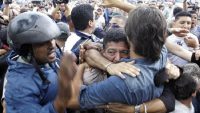
La Tierra necesita una bioeconomía de la Amazonia
El cambio climático y la pérdida de biodiversidad están llevando a los ecosistemas vitales del mundo al borde del colapso. Los científicos advierten que ya se han violado seis de nueve límites planetarios clave. Proteger y conservar las selvas tropicales es crucial, pero para hacerlo necesitamos inversión en estado de derecho y en nuevos modelos económicos que combinen reducciones significativas de las emisiones con alternativas viables para desmontar los bosques. En ninguna parte este desafío es más apremiante que en la Amazonia.
Con una extensión de más de ocho millones de kilómetros cuadrados, la Amazonia es hogar de la selva tropical más grande del mundo.… Seguir leyendo »













